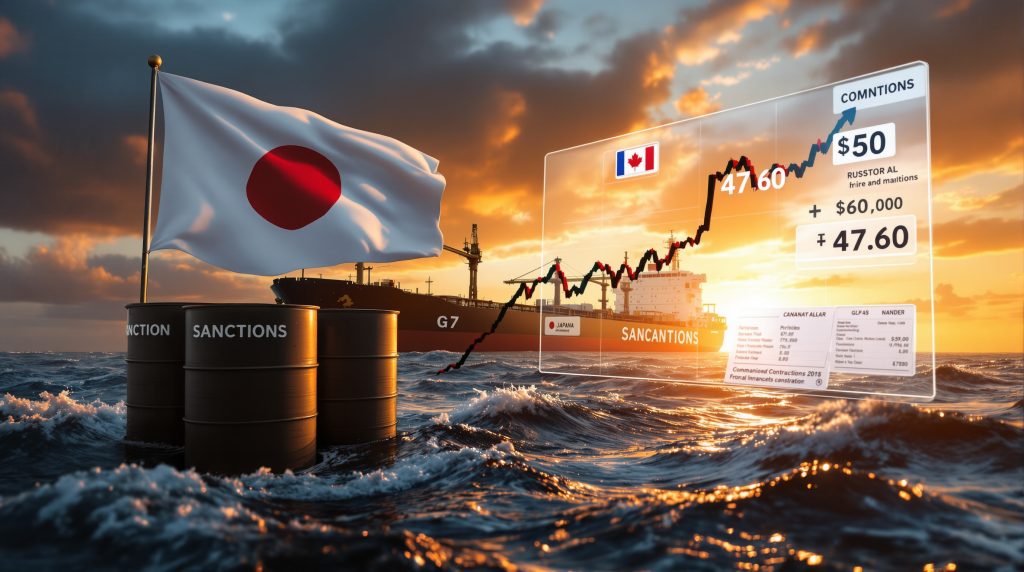How Does the New Russian Oil Price Cap Work?
Japan has implemented a significant reduction in the price cap for Russian oil, lowering it from $60 to $47.60 per barrel. This strategic move, announced in September 2023, aligns with similar measures taken by the European Union and other G7 nations. The cap creates a critical threshold above which Japanese companies cannot provide insurance, financing, or other services for the transport of Russian crude oil by sea.
The price cap mechanism functions as a targeted economic sanction rather than an outright ban. It allows Russian oil to continue flowing to global markets—preventing supply disruptions that could spike prices—while simultaneously limiting Moscow's revenue from these exports.
Key Implementation Details
- Effective Date: The new price cap implementation began in late 2023
- Grace Period: Provides transition time for contracts already in process
- Scope: Covers seaborne Russian crude oil exports
- Enforcement: Prohibits Japanese firms from providing shipping services, insurance, or financing for Russian oil priced above the cap
Why Has Japan Reduced the Russian Oil Price Cap?
The decision to lower the price cap reflects a calculated response to several geopolitical and economic factors. As the Russia-Ukraine conflict continues, Japan and its G7 partners have sought more effective ways to pressure Moscow while minimizing global energy market disruptions.
Strategic Objectives Behind the Cap Reduction
- Tightening Economic Pressure: The lower cap aims to further restrict Russia's oil revenue, which funds its military operations
- Responding to Evasion Tactics: Evidence suggests Russia had developed workarounds for the previous $60 cap
- Coordinated International Action: Japan's move synchronizes with EU policies, strengthening the collective impact
- Balancing Energy Security: The carefully calibrated figure attempts to keep Russian oil flowing to prevent market shocks
According to financial analysts at the Institute for International Finance, price cap mechanisms represent one of the most sophisticated sanctions tools deployed in recent years, designed to impact revenue streams while maintaining global supply stability.
What Additional Sanctions Has Japan Implemented?
Beyond the oil price cap reduction, Japan has expanded its sanctions regime with several complementary measures targeting Russian entities and individuals connected to the ongoing conflict.
Comprehensive Sanctions Package
- Asset Freezes: Multiple individuals and organizations linked to the Russian government now face asset freezes
- Export Restrictions: New limitations on exports to Russian companies in strategic sectors
- Financial Sector Measures: Enhanced restrictions on banking and financial services
- Technology Transfer Bans: Expanded controls on dual-use technologies that could support military operations
These measures represent Japan's most comprehensive sanctions package since the beginning of the Russia-Ukraine conflict, signaling Tokyo's deepening alignment with Western powers on this issue.
How Will This Impact Global Oil Markets?
The reduced price cap introduces new dynamics into global oil markets, potentially affecting prices, trade flows, and market stability. While designed to minimize disruption, the cap could still have several market consequences.
Market Implications
| Potential Impact | Likelihood | Explanation |
|---|---|---|
| Global price increases | Moderate | Some market tightening possible if Russian exports decrease |
| Redirection of Russian exports | High | Increased flows to non-G7 nations like China and India |
| Shadow fleet expansion | High | Growth in alternative shipping networks outside Western insurance |
| Price discounts on Russian crude | Very High | Deeper discounts to Brent benchmark to stay under cap |
| Market volatility | Moderate | Temporary uncertainty as market adjusts to new parameters |
Energy analysts at the Oxford Institute for Energy Studies suggest the cap's effectiveness will depend largely on how strictly it's enforced and whether major buyers like China and India respect its provisions, even informally. Recent oil price stagnation has also complicated market dynamics, creating additional challenges for policymakers.
Will Japan's Energy Supply Be Affected?
Despite implementing the price cap, Japan has structured its approach to minimize domestic energy security risks. The country has gradually reduced its dependence on Russian energy since 2022, making it less vulnerable to potential supply disruptions.
Japan's Exposure to Russian Oil
- Current Import Level: Japan has significantly reduced its Russian oil imports since 2022
- Strategic Exemptions: Certain projects with Japanese investment retain special consideration
- Alternative Supply Sources: Japan has diversified its oil imports, increasing purchases from Middle Eastern suppliers
- Strategic Reserves: The country maintains substantial strategic petroleum reserves (approximately 145 days of consumption according to IEA data) to buffer against supply shocks
Japan's Ministry of Economy, Trade and Industry has emphasized that energy security remains a top priority, with the country working to ensure stable supply channels while supporting international sanctions efforts.
How Has Russia Responded to the Price Cap?
Moscow has consistently opposed the price cap mechanism since its introduction, developing various countermeasures and workarounds to maintain its oil export revenue.
Russia's Adaptation Strategies
- Alternative Payment Systems: Development of non-dollar payment channels outside Western banking systems
- Shadow Fleet Expansion: Growth in tanker fleets operating without Western insurance
- New Market Development: Strengthened energy relationships with non-G7 nations
- Discounted Sales: Offering significant price discounts to maintain market share
- Threats of Production Cuts: Periodic warnings about reducing output to drive up global prices
Maritime tracking services have documented the growth of Russia's "shadow fleet" of tankers operating outside traditional insurance frameworks, indicating Moscow's determination to circumvent Western sanctions. Furthermore, the tariff global impact on energy markets has created additional complexity in monitoring sanctions effectiveness.
What Is the G7's Broader Strategy on Russian Energy?
The price cap reduction represents one element of a multifaceted G7 strategy to limit Russia's oil revenue while maintaining global market stability. This approach has evolved significantly since the initial sanctions following the 2022 invasion of Ukraine.
Evolution of G7 Energy Sanctions
- Phase 1: Initial import bans and financial restrictions
- Phase 2: Introduction of the price cap mechanism
- Phase 3: Enhanced enforcement and anti-evasion measures
- Phase 4: Coordinated adjustments to price cap levels
The G7 has increasingly focused on closing loopholes and improving enforcement mechanisms, recognizing that Russia has demonstrated considerable adaptability to earlier measures. Ongoing US oil production decline has also influenced the strategic calculus as global supply balances shift.
How Effective Are Oil Price Caps as Economic Sanctions?
The effectiveness of price caps as economic sanctions remains a subject of debate among energy policy experts. While they offer certain advantages over outright embargoes, their impact depends on multiple factors.
Evaluating Price Cap Effectiveness
| Advantage | Challenge | Current Assessment |
|---|---|---|
| Allows continued market supply | Difficult to enforce globally | Partially effective |
| More targeted than full embargoes | Vulnerable to evasion tactics | Moderate impact on Russian revenue |
| Reduces price spikes for consumers | Requires international cooperation | Effectiveness improving with enforcement |
| Flexible and adjustable | Shadow fleets undermine enforcement | Revenue reduction variable by market phase |
The Peterson Institute for International Economics has noted that price cap mechanisms occupy a middle ground between comprehensive embargoes and targeted sanctions, aiming to balance economic impact with market stability. Regular monitoring of oil price movements helps policymakers adjust these mechanisms for maximum effectiveness.
What Does This Mean for International Relations?
Japan's decision to lower the price cap reflects its continuing alignment with Western powers on the Russia-Ukraine conflict, despite its traditionally cautious approach to international disputes.
Geopolitical Implications
- Strengthened G7 Unity: Demonstrates continued coordination among advanced democracies
- Japan-US Relations: Reinforces Japan's commitment to its security alliance with the United States
- Japan-Russia Relations: Further complicates already strained bilateral ties
- Asia-Pacific Dynamics: Highlights divisions between G7-aligned nations and those maintaining closer ties with Russia
The move also signals Japan's increasing willingness to use economic tools to advance security objectives, a notable shift in its foreign policy approach. Ongoing US–China trade impacts have further complicated the geopolitical landscape in which these sanctions operate.
How Might This Affect Future Energy Markets?
Beyond its immediate impact, the price cap reduction could accelerate several longer-term trends in global energy markets and geopolitics.
Long-Term Market Implications
- Accelerated Energy Transition: Further incentivizes reduced dependence on fossil fuels
- Fragmented Energy Markets: Contributes to the division between Western and non-Western energy systems
- New Pricing Mechanisms: May lead to alternative benchmark development outside Western control
- Insurance Market Changes: Could permanently alter maritime insurance practices for energy shipping
- Enhanced Sanctions Frameworks: Provides a template for future economic pressure campaigns
Energy security experts at the Japan Petroleum Energy Center suggest these developments may ultimately lead to a more regionalized global energy market with distinct trading blocs and pricing systems.
What Happens Next with Global Oil Sanctions?
The reduction of the price cap represents a significant escalation in economic pressure, but several factors will determine what additional measures might follow.
Future Scenarios
- Enhanced Enforcement: Stricter monitoring and penalties for cap violations
- Secondary Sanctions: Potential measures against third countries enabling circumvention
- Further Cap Adjustments: Additional modifications if current level proves insufficient
- Technological Controls: New restrictions on oil production and refining equipment
- Diplomatic Initiatives: Expanded efforts to convince non-G7 nations to respect the cap
The effectiveness of the current cap reduction will likely determine whether further escalation becomes necessary in the coming months.
FAQ: Japan's Russian Oil Price Cap
How does the price cap affect global oil prices?
The cap is designed to limit Russia's revenue while allowing oil to continue flowing to global markets. While some market volatility is possible during adjustment periods, the cap aims to prevent major price spikes by maintaining supply levels.
Does the price cap apply to natural gas?
No, the current price cap mechanism applies specifically to crude oil and petroleum products. Natural gas exports, including LNG, operate under different regulatory frameworks.
How do countries enforce the price cap?
Enforcement relies primarily on prohibiting essential shipping services—including insurance, financing, and navigation—for vessels carrying Russian oil priced above the cap. Since most maritime shipping relies on Western insurance, this creates significant compliance pressure.
Has Russia found ways around the price cap?
Yes, Russia has developed several workarounds, including building a "shadow fleet" of tankers operating without Western insurance, establishing alternative payment channels, and offering significant discounts to buyers willing to ignore the cap.
Will the price cap end when the conflict in Ukraine ends?
While the price cap is directly linked to Russia's actions in Ukraine, its removal would likely be part of a broader negotiated settlement including multiple sanctions relief measures and would depend on the specific terms of any peace agreement.
Further Exploration
Readers interested in learning more about global oil markets and sanctions can explore related educational content from organizations like the International Energy Agency, which provides regular updates on developments in international energy markets and geopolitics.
Disclaimer: This article provides an analysis of international sanctions and market mechanisms. The situation remains fluid, and policy changes may occur rapidly. The information presented is based on publicly available data and expert analysis as of publication.
Want to Catch the Next Big Mineral Discovery Before the Market Does?
Discovery Alert's proprietary Discovery IQ model instantly notifies investors of significant ASX mineral discoveries, turning complex data into actionable insights with substantial return potential. Explore how major discoveries can transform investment portfolios by visiting our dedicated discoveries page and start your 30-day free trial today.




